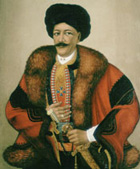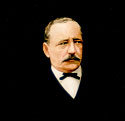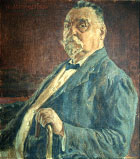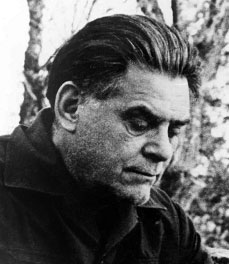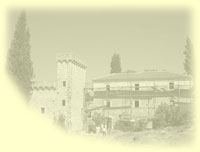
* History & famous people
The Janković Castle is an important monument in Croatia, officially proclaimed as a first category cultural monument. It is situated 20 kilometres from the city of Zadar, in the village of Islam Grčki.
Its early history is not known, but the castle was probably built on the remains of a medieval castle owned by the Bishop of Nin. Its church (for the last four centuries an Orthodox church) was built much earlier and judging by its style was an early Croatian Catholic church.
The position of the castle became very important at the end of the 16th century when the borderline between the Venetian Republic and the Ottoman Empire was established here. The Ottoman built a defensive fortress here which also gave the name of the whole of the village Sed-Islam which means the frontier of Islam. In the 17th century the whole of the area became part of the Venetian Republic and the castle was given as property to Stojan Janković who was a national hero for his battles against the Ottomans.
The castle is still the property of his descendants – the family Desnica. Vladan Desnica, the famous Croatian writer, opened the castle to the public and gradually turned it into a museum with a botanical garden. The family still holds valuable and important collections of icons (16th-18th c.), 19th century pictures, valuable sacral objects, a collection of medieval weapons, objets d’arte, an ethnographic collection, an archaeological collection, a library with circa 6,000 books collected over the centuries, many of them in foreign languages (primarily in Italian and French), furniture, geographic maps etc.
The destiny of a number of important people was also tied-in with this castle:
Stojan Janković (? -1687) cavaliere, uskok. He was distinguished by his military abilities in Candian War. He was apprehended and caught by Ottomans in 1666 and imprisoned in Istanbul, but escaped after 14 months. He participated in the conquest of the fortification Sinj (1686) during the Morean War and many other battles against the Ottomans. For his military accomplishments the Venetian Republic granted him the title cavaliere and the estate-fortification in Islam Grčki in 1670. His exceptional exploits and bravery animated a number of folk poems. He was killed during an attack on Duvno 23rd August 1687.
Conte Ilija Dede Janković (1818-1874): was the last direct heir of Stojan Janković. Highly educated and refined intellectual (studied in Padua) he had spoken Italian, French, German and Russian, and learnt also Old Latin and Greek. He established the library in the castle. He was a writer, publicist and politician, a supporter of religious tolerance, and of solidarity of all Slavic nations.
Vladimir Desnica (1850-1922): politician and entrepreneur. A mayor of the nearby town of Obrovac 1882-1912. He initiated and worked on the improvements of technical methods in agriculture and live stock breeding in the region and his estate (won awards at agricultural exhibitions for his products). He helped very actively in the uprising in Bosnia and Herzegovina against Ottoman occupation in 1875-78. In 1889 he supported the so-called Zadarski kompromis about the alliance of Croatian and Serbian parties in Dalmatia. He supported the collaboration of Croatian and Serbian political parties in Dalmatinski Sabor (Dalmatian Parliament) and elsewhere. In 1903 started a journal Novi srpski list (New Serbian Journal). His archive collection, containing in particularly his correspondence regarding the Bosnia and Herzegovina uprising, is now in Croatian Historical Museum, Zagreb.
Vladan Desnica (1905-1967): writer, translator, lawyer. He ended early his law career in Split and Zagreb to devote himself completely to writing. Author of two novels, 35 stories, a book of verses, a drama, a film scenario, and a number of essays, reviews, etc. Both his novels and short story books have had a large number of editions and translations in various languages (18 languages to date). Two editions of his collected works, as well as of selected works have been published to date. Two books of Vladan Desnica were included in the edition Five hundred years of Croatian literature. Vladan Desnica himself also translated from French (A. Gide, M. Ayme, J. Paulhan), from Italian (B. Croce, G. Cavalcanti, G. Leopardi, I. Silone, L. Venturi, U. Foscolo, E. Sequi, O. Ramous) and from Russian (L.N. Tolstoj and A.S. Puskin). Stylistic characteristics of his work ranged from realistic stories to modern, analytical novel in search of deepest meanings of human existence. Literary work of Vladan Desnica “created one of the best, most coherent, and most rounded up artistic opuses in Croatian literature”. Up to 1990 there were three monographic books and more than 300 bibliographic pieces (studies, papers, etc.) in many languages on literary work of Vladan Desnica. He often lived and wrote in the castle and chose it as his final resting place. MORE INFORMATION ABOUT VLADAN DESNICA CAN BE FOUND ON THE DESNICA MEETINGS PAGES UNDER ACTIVITIES
website by Vidagents
